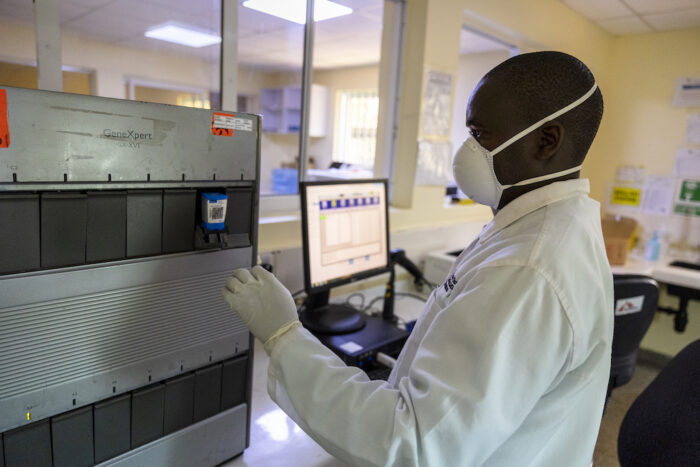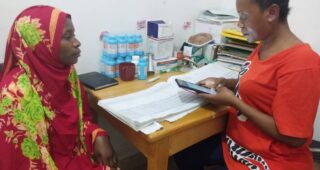Lab Accreditation in Kenya
Laboratory accreditation is the internationally accepted framework for increasing test quality and reducing the frequency of laboratory errors. The significance of the accreditation of Homabay County Referral Hospital Laboratory cannot be overemphasized in the early initiation of HIV treatment and appropriate management of people living with HIV.

Francis Omondi Onyango, a technical advisor at the accredited laboratory explains that managing HIV patients involves life changing clinical decisions informed by laboratory results.
He says that laboratory testing is a process of many steps, and if an error occurs in any of these steps, it could lead to a wrong diagnosis and or inappropriate treatment.
“Accreditation is that recognition by an authority, in this case, the Kenya Accreditation Service (KENAS) that a laboratory has complied with the quality and competence standards that must be in place for accurate, reliable and safe testing,” Onyango expounds.
KENAS is the sole national accreditation body mandated by the government of Kenya to provide accreditation services.
The Accreditation Journey

Homabay County Referral Hospital began the long and winding journey towards accreditation in 2013. The accreditation process is expensive and partnerships were needed to support government efforts to improve standards so as to meet accreditation requirements.
The accreditation process stalled and was re-activated in 2016. At this point, other partners, including the Elizabeth Glaser Pediatrics AIDS Foundation (EGPAF), were on board in a concerted effort towards achieving accreditation by the end of 2018.
“The accreditation process is a quality improvement exercise. The laboratory identifies and fills gaps in its systems.”
“The accreditation process is a quality improvement exercise. The laboratory identifies and fills gaps in its systems. There are many areas of quality assessment before accreditation such as human resource, quality management system, equipment and reagents, commodity supplies and sample management, and management of records,” explains Francis Oduka, a laboratory technician at the referral hospital.
EGPAF, the hospital’s local antiretroviral therapy (ART) partner provided technical support towards meeting processes that achieve and maintain accreditation status.
As such, EGPAF supported six laboratory personnel, staff capacity building especially in tuberculosis (TB) management and laboratory biosafety, supported staff to attend a KENAS technical assessment training, provided commodities and tools such as stock cards, managed equipment, and continues to support the annual quality management system meetings where the status of the laboratory is discussed.
Importantly, the laboratory was assessed and its performance certified by the highly respected African Society for Laboratory Medicine (ASLM) and this was the final step to accreditation in December 2018.
Expanded Access

With the stamp of approval, early infant diagnosis (EID), the test for diagnosing HIV in infants and children below 18 months, has never been more accessible.
Today, result of an EID are available within two to six hours which facilitates quick decision making and response.
Previously, samples were sent to Kisumu County to be processed within two weeks. Today, result of an EID are available within two to six hours which facilitates quick decision making and response.
Other critical tests such as the CD4 Count for immunological and viral load for virological monitoring and, Gene-Xpert tests for TB diagnosis are now available and accessible at the referral hospital.
Gideon Mikoye Libulele, a Senior Technical Officer in HIV care and treatment at EGPAF says that a CD4 test is especially critical in the “management of patients with advanced HIV disease or progressed HIV, children under the age of five whose HIV suppression status is unknown and in patients in care for a long time but were lost to follow up.”
He says that virological monitoring is key because opportunistic infections among those with a CD4 count of less than 200 is a real concern. These infections include TB and cryptococcal meningitis which contributes at least 15 percent of AIDS-related deaths.
“Additionally, over time we are also seen a cancer in HIV patients called Kaposis sarcoma. In 2020 alone, we recorded 24 cases of Kaposi sarcoma. For women of reproductive health age we screen for cervical cancer,” Libulele observes.
Today, the laboratory is helping shift the goal to efficiently cater to those left behind such as those not tested, those not on treatment and those not virally suppressed.
Joyce Chimbi
Kenya
Strengthening Local Capacity



